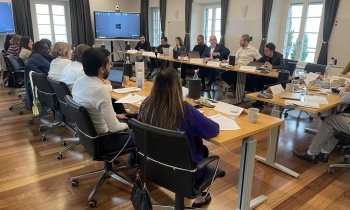QUNO hosts meeting of minds on plastic pollution in Bellagio

The Quaker United Nations Office (QUNO) organised an influential residential workshop at the Rockefeller Foundation's Bellagio Center, on Lake Como, Italy, entitled “Plastic Money: Turning off the Subsidies Tap” from 26 to 30 March 2024.
QUNO’s Sustainable and Just Economic Systems (SJES) programme took the lead on this event and brought together a diverse group of 21 stakeholders. This included government representatives, inter-governmental bodies, legal scholars and social scientists, non-governmental organisations, and experts from charitable foundations.
The event was strategically set between significant international meetings, emphasising the urgent need for collaborative action against plastic pollution, particularly focusing on the elimination of harmful subsidies to primary plastic production.
Through a series of brainstorming sessions, roundtable discussions, and bilateral conversations, the event fostered an enhanced level of understanding among government negotiators and civil society experts on this issue, empowering them with tools needed for effective advocacy.
One important outcome was the crafting of specific draft language aimed at tackling plastic subsidies, intended for consideration by negotiators of the Intergovernmental Negotiating Committee (INC) for an international legally binding instrument to end plastic pollution. Another important deliverable from the Bellagio Convening was the crafting on an Information Sheet that outlines practical steps and provides insights into the economic and environmental impacts of subsidies that fuel primary plastic polymer production. Developed collaboratively by QUNO, CIEL, IUCN, and Fredric Bauer (affiliated with Lund University, contributing in his personal capacity), this document . This resource aims to aid stakeholders in advocacy and policy-making, ensuring a well-rounded approach to tackling plastic subsidies. Find the Information Sheet attached.
Moreover, the Bellagio gathering underscored the strategy of starting with a core coalition of smaller and medium-sized countries committed to addressing the issue of subsidies. This approach, inspired by insights shared during the convening, focuses on building a strong foundational coalition that can gradually expand, attracting broader support for meaningful change in international policy.
Thanks to this Bellagio convening, QUNO gained recognition for its work, setting the stage for an increased presence in ongoing initiatives.
An outcome from this event is that QUNO participated in Anja Krieger’s Plastisphere podcast, where SJES senior technical advisor, Ronald Steenblik, took the lead on discussing the nuances of plastic subsidies within the INC context, offering a deep dive into the technical aspects and sharing key outcomes from our Bellagio meeting.
Andres Naranjo, SJES programme associate further explained the critical role of international mechanisms, notably the World Trade Organisation’s Dialogue on Plastic Pollution and Environmentally Sustainable Plastics Trade (DPP), in complementing and reinforcing QUNO’s ongoing efforts against plastic pollution engagement.
Dr. Alexandra R. Harrington, a key collaborator from the International Union for the Conservation of Nature (IUCN), further contributed her expertise. As chair of the IUCN Task Force on Plastic Pollution, Dr. Harrington shared valuable perspectives on the legal and environmental aspects of plastic pollution, underscoring the collaborative nature of our work and the synergies between different forums and their contributions to the overarching goal of mitigating plastic pollution.
Another achievement emerging from the Bellagio Convening was QUNO’s invitation by the co-convenors of the WTO’s Dialogue on Plastic Pollution (DPP) to present our insights on transparency and plastic-related subsidies during the DPP’s next pre-plenary meeting held on 12 April 2024.
This opportunity amplifies our influence in shaping global discourse on eliminating plastic subsidies, a key driver of the pollution crisis, and complements our work for the INC process.
QUNO, in collaboration with key partners from the IUCN and the Center for International Environmental Law (CIEL) is ready to deepen our advocacy. Our collective ambition is to refine the global understanding and quantification of subsidies to primary plastics production, offering strategic insights for the upcoming INC meetings and future environmental policymaking.
Through these coordinated efforts, QUNO is dedicated to spearheading significant advancements in international environmental governance, aspiring towards a sustainable future, one in which economic incentives do not exacerbate the plastic pollution crisis.


